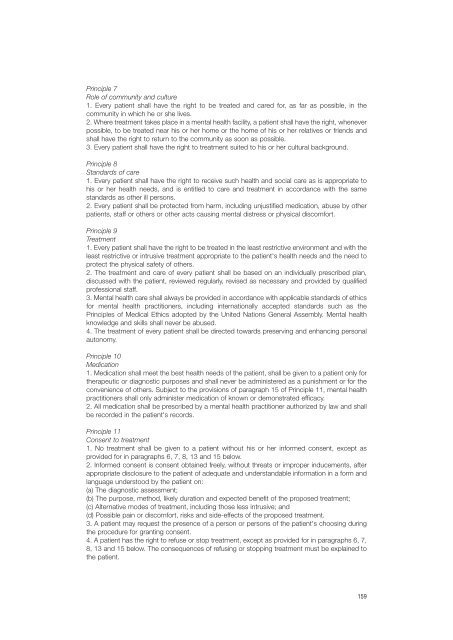human rights and legislation who resource book on mental health
human rights and legislation who resource book on mental health
human rights and legislation who resource book on mental health
Create successful ePaper yourself
Turn your PDF publications into a flip-book with our unique Google optimized e-Paper software.
Principle 7<br />
Role of community <str<strong>on</strong>g>and</str<strong>on</strong>g> culture<br />
1. Every patient shall have the right to be treated <str<strong>on</strong>g>and</str<strong>on</strong>g> cared for, as far as possible, in the<br />
community in which he or she lives.<br />
2. Where treatment takes place in a <strong>mental</strong> <strong>health</strong> facility, a patient shall have the right, whenever<br />
possible, to be treated near his or her home or the home of his or her relatives or friends <str<strong>on</strong>g>and</str<strong>on</strong>g><br />
shall have the right to return to the community as so<strong>on</strong> as possible.<br />
3. Every patient shall have the right to treatment suited to his or her cultural background.<br />
Principle 8<br />
St<str<strong>on</strong>g>and</str<strong>on</strong>g>ards of care<br />
1. Every patient shall have the right to receive such <strong>health</strong> <str<strong>on</strong>g>and</str<strong>on</strong>g> social care as is appropriate to<br />
his or her <strong>health</strong> needs, <str<strong>on</strong>g>and</str<strong>on</strong>g> is entitled to care <str<strong>on</strong>g>and</str<strong>on</strong>g> treatment in accordance with the same<br />
st<str<strong>on</strong>g>and</str<strong>on</strong>g>ards as other ill pers<strong>on</strong>s.<br />
2. Every patient shall be protected from harm, including unjustified medicati<strong>on</strong>, abuse by other<br />
patients, staff or others or other acts causing <strong>mental</strong> distress or physical discomfort.<br />
Principle 9<br />
Treatment<br />
1. Every patient shall have the right to be treated in the least restrictive envir<strong>on</strong>ment <str<strong>on</strong>g>and</str<strong>on</strong>g> with the<br />
least restrictive or intrusive treatment appropriate to the patient's <strong>health</strong> needs <str<strong>on</strong>g>and</str<strong>on</strong>g> the need to<br />
protect the physical safety of others.<br />
2. The treatment <str<strong>on</strong>g>and</str<strong>on</strong>g> care of every patient shall be based <strong>on</strong> an individually prescribed plan,<br />
discussed with the patient, reviewed regularly, revised as necessary <str<strong>on</strong>g>and</str<strong>on</strong>g> provided by qualified<br />
professi<strong>on</strong>al staff.<br />
3. Mental <strong>health</strong> care shall always be provided in accordance with applicable st<str<strong>on</strong>g>and</str<strong>on</strong>g>ards of ethics<br />
for <strong>mental</strong> <strong>health</strong> practiti<strong>on</strong>ers, including internati<strong>on</strong>ally accepted st<str<strong>on</strong>g>and</str<strong>on</strong>g>ards such as the<br />
Principles of Medical Ethics adopted by the United Nati<strong>on</strong>s General Assembly. Mental <strong>health</strong><br />
knowledge <str<strong>on</strong>g>and</str<strong>on</strong>g> skills shall never be abused.<br />
4. The treatment of every patient shall be directed towards preserving <str<strong>on</strong>g>and</str<strong>on</strong>g> enhancing pers<strong>on</strong>al<br />
aut<strong>on</strong>omy.<br />
Principle 10<br />
Medicati<strong>on</strong><br />
1. Medicati<strong>on</strong> shall meet the best <strong>health</strong> needs of the patient, shall be given to a patient <strong>on</strong>ly for<br />
therapeutic or diagnostic purposes <str<strong>on</strong>g>and</str<strong>on</strong>g> shall never be administered as a punishment or for the<br />
c<strong>on</strong>venience of others. Subject to the provisi<strong>on</strong>s of paragraph 15 of Principle 11, <strong>mental</strong> <strong>health</strong><br />
practiti<strong>on</strong>ers shall <strong>on</strong>ly administer medicati<strong>on</strong> of known or dem<strong>on</strong>strated efficacy.<br />
2. All medicati<strong>on</strong> shall be prescribed by a <strong>mental</strong> <strong>health</strong> practiti<strong>on</strong>er authorized by law <str<strong>on</strong>g>and</str<strong>on</strong>g> shall<br />
be recorded in the patient's records.<br />
Principle 11<br />
C<strong>on</strong>sent to treatment<br />
1. No treatment shall be given to a patient without his or her informed c<strong>on</strong>sent, except as<br />
provided for in paragraphs 6, 7, 8, 13 <str<strong>on</strong>g>and</str<strong>on</strong>g> 15 below.<br />
2. Informed c<strong>on</strong>sent is c<strong>on</strong>sent obtained freely, without threats or improper inducements, after<br />
appropriate disclosure to the patient of adequate <str<strong>on</strong>g>and</str<strong>on</strong>g> underst<str<strong>on</strong>g>and</str<strong>on</strong>g>able informati<strong>on</strong> in a form <str<strong>on</strong>g>and</str<strong>on</strong>g><br />
language understood by the patient <strong>on</strong>:<br />
(a) The diagnostic assessment;<br />
(b) The purpose, method, likely durati<strong>on</strong> <str<strong>on</strong>g>and</str<strong>on</strong>g> expected benefit of the proposed treatment;<br />
(c) Alternative modes of treatment, including those less intrusive; <str<strong>on</strong>g>and</str<strong>on</strong>g><br />
(d) Possible pain or discomfort, risks <str<strong>on</strong>g>and</str<strong>on</strong>g> side-effects of the proposed treatment.<br />
3. A patient may request the presence of a pers<strong>on</strong> or pers<strong>on</strong>s of the patient's choosing during<br />
the procedure for granting c<strong>on</strong>sent.<br />
4. A patient has the right to refuse or stop treatment, except as provided for in paragraphs 6, 7,<br />
8, 13 <str<strong>on</strong>g>and</str<strong>on</strong>g> 15 below. The c<strong>on</strong>sequences of refusing or stopping treatment must be explained to<br />
the patient.<br />
159

















